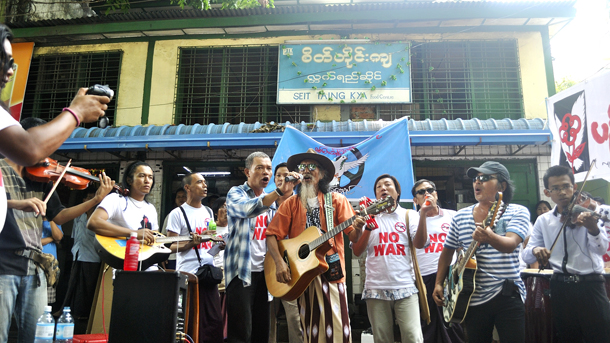RANGOON—A group of musicians is hitting the city’s teashops for a weekly fundraising gig to help the tens of thousands of civilians victimized by the raging war between government troops and the Kachin Independence Army (KIA) in northernmost Burma.
Led by the veteran musician Ye Lwin, 65, the members of “Pan ye Lan” entertain teashop-goers enjoying their Sunday morning breakfasts with their unplugged live performances. The cash collected goes to war victims who have been forced to flee their homes to temporary refugee camps scattered along the Sino-Burmese border.
“We want no civil war in Burma. But with the ongoing war in the north, we need to find a way to help the victims,” said Ye Lwin, who has decided to keep the activity running until the conflict is over. “So here we are. I hope what we are doing now will give some idea to other people or musicians that there’s a way to help these victims.”
With the motto “helping the people by the people,” the group debuted their charity activity last week and raised 3,100,000 kyat (US $3,790) from tours in Rangoon and Mandalay. They then handed the donations to an NGO working in Kachin State, Toe Lwin, the singer-cum-songwriter of the group, told The Irrawaddy. “This week we got about 2,300,000 kyats [$2,810],” he added.
Teashop owners who allow the group to use their premises said they felt obliged to support their fundraising work due to the intensifying war in Kachin State.
“Even though we’d like to help [the victims], we can’t go there,” said one of the teashop owners. “So by offering a venue to the group for their activities, I’m also helping the war refugees in a way. It’s sort of a win-win situation.”
Khon Ja, 42, who is helping the group through an information-sharing service to channel their donations to the needy, said that the fundraising activity indicated that the war in Kachin State has become a national issue.
“It’s collaboration between musicians and well-wishers from all walks of life,” she said. “Let’s say it’s an all-inclusive activity. I feel glad people have seemed to accept the Kachin issue as a national concern.”
The KIA is one of several ethnic rebel armies in Burma seeking autonomy from central government. Fighting resumed in Kachin State last June—the first time since a ceasefire deal was signed in 1994.
Relations broke down after the ethnic militia refused to become a Border Guard Force reporting to Naypyidaw. Since then, humanitarian agencies claim that more than 75,000 civilians, including many women and children, have fled the fighting.
Three rounds of peace talks between the Kachin Independence Organization, the KIA’s political wing, and the Burmese government have failed to reach any peace deal.
“Our activity is meant to give a message to people in war-torn Kachin State that they are not alone, and we Burmese are with them. We have no hidden agenda,” said one of the group members.
“I don’t want to say that we will continue our fundraising activity until the war is over, but that doesn’t mean that we are tired of going out to collect donations. We only hate the prolonged war. If it stops today, it’s good for all of us,” he added.
Late on Sunday morning, when Pan ye Lan members started playing music outside a crowded teashop, their music drew huge attention from passers-by. Even passengers riding past in taxis stopped to give donations.
When he finished his tea, a middle-aged man handed a wad of cash to Ye Lwin after listening to the peace-themed songs played by the group.
“Five hundred thousand kyats in total [$610],” he said. “My contribution to your fundraising for the war victims. Only one thing, I want to remain anonymous.”















